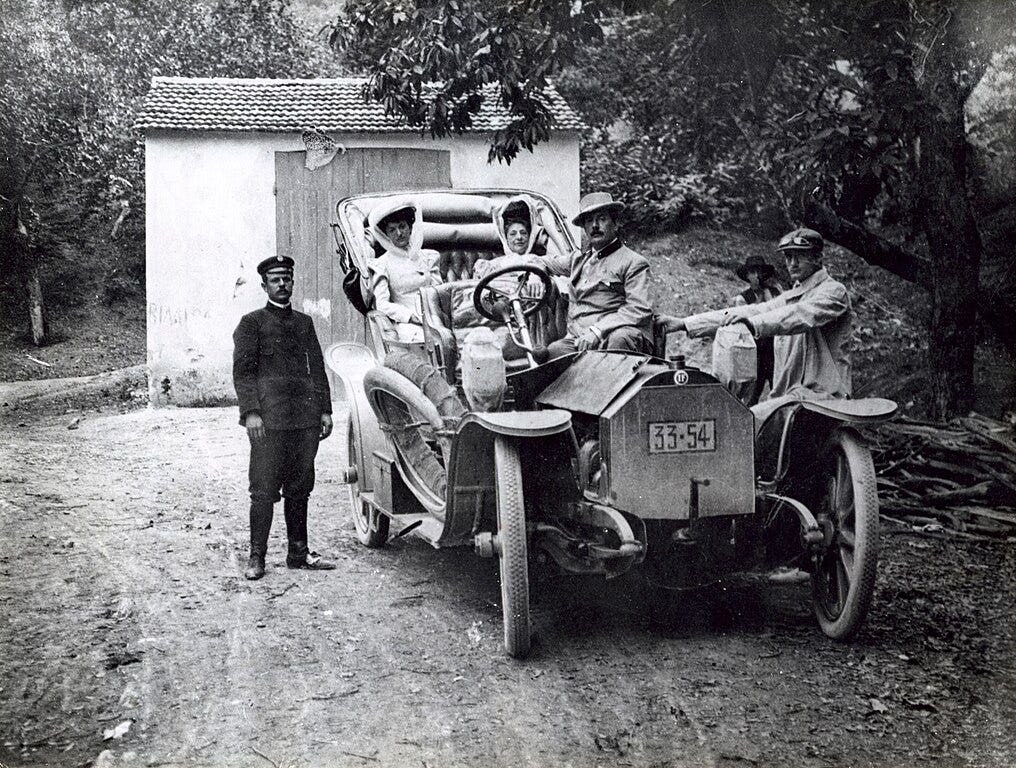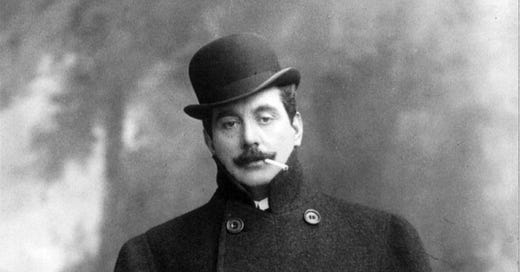Full Episode
You can also download this podcast on all major platforms including Apple Podcasts and Spotify.
Transcript
We’re Inside Vancouver Opera and I’m Ashley Daniel Foot—and today, we’re stepping into the world of one of opera’s most passionate, enduring, and beloved composers.
His name is synonymous with soaring arias, impossible love stories, and music that grabs you by the heart and doesn’t let go. This is the story of Giacomo Puccini.
Inside Vancouver Opera presents: Un bel dì, A Life Begins: The World of Puccini written and performed by Jane Potter.
So settle in, whether you're a seasoned opera lover or just Puccini-curious. This is a story of artistic fire, of human drama—and of one man’s quest to give voice to the most fragile and fierce parts of the human soul.
The Year is 1858.
On December 22, in the medieval walled town of Lucca, in the Grand Duchy of Tuscany in present day Italy, Giacomo Puccini was born, the sixth of nine children to his parents Michele Puccini, and Albina Magi.
These were fascinating times of great achievements in arts, technology, and exploration across the world. Just four months before Puccini’s birth, across the English Channel Queen Victoria sent US President James Buchanan the first ever transatlantic telegraph cable:
"The Queen desires to congratulate the President upon the successful completion of this great international work.”
While over in Paris, Jacques Offenbach’s Orpheus in the Underworld premiered, featuring the Infernal Gallop, also known as the catchy can-can tune.
In the same year, in the newly minted country of Canada, the Fraser River Gold Rush began with the arrival in British Columbia of miners from California.
Interesting times indeed!
The Puccini family had become something of a musical dynasty in Lucca that stretched back to Giacomo’s great great grandfather who held a position as maestro di capella in the cathedral, with his son, grandson, and great grandson Michele succeeding him in the position.
The young Puccini was expected to one day succeed his father in the role but unfortunately, Giacomo was only six years old when his father died, too young to assume such an important role.
Giacomo did, however, maintain an interest in all things musical at the cathedral, singing in the choir and playing the organ, all while receiving music lessons paid for by his uncle.
At the age of 18, Puccini saw his first opera, Guiseppe Verdi’s Aida, the effect of which Puccini said was “like a window opening”.
Now highly motivated, Puccini continued his studies in earnest, attending the Conservatory of Music in Milan where he met many of the leading musicians and composers of the day.
In 1883 by the age of 25, Puccini had composed his first work, the Capriccio Sinfonico which met with critical acclaim at the hands of the conductor Faccio in both Milan and Turin.
By 1889, Puccini had composed his first opera, Edgar, which did not meet with the approval of audiences or critics. Undeterred Puccini persevered composing Manon Lescaut, which premiered in Turin in 1893 to generally favourable reviews.
In 1894, after Manon Lescaut opened in London to further critical acclaim, just one week after the premiere of Verdi’s final opera Falstaff, Irish playwright George Bernard Shaw declared:
"Puccini looks to me more like the heir of Verdi than any of his rivals."
But where Verdi came from the Romantic movement, Puccini was breathing new life into opera through the concept of verismo, Italian for realism. Featuring flawed, human characters, intense emotional themes, and real-life relatable plots, verismo moved opera away from Gods and historical tales and focused instead on common people and their often tragic stories.
One of Puccini’s most well known and successful operas, La bohème, marks his first efforts at verismo. Adapted from the novel La Vie de Bohème by Henri Murger, the opera follows the lives of an impoverished seamstress and her bohemian friends in Paris in the 1830s.
Wildly popular almost from its first showing, La bohème continues to be one of the most performed operas ever written. It was even the inspiration for the hit Broadway musical, Rent.
Delving even further into the verismo style, Puccini followed La bohème with the equally well received Tosca in 1900 considered by many to be almost Wagnerian, with its use of musical signatures known as leitmotivs made famous by Wagner in such operas as The Flying Dutchman and now common in popular culture.
Very much a man of his times, Puccini was fascinated with advances in technology including cars, and motor boats, but particularly the recording technology.
Puccini followed the inventions of his contemporary American, Thomas Edison, closely, especially advancements of the phonograph. By the early 1900s, many of Puccini’s works had been recorded on wax cylinders and early records.
There is little question that Puccini’s later financial success was assisted greatly by the ability of his adoring fans to play his music right in their homes.
Unfortunately, Puccini’s love of automobiles took a turn when he was involved in a terrible car crash in 1904 which left him bedridden for eight months.

It was during this time that Puccini embarked on what may be his greatest legacy - Madama Butterfly.
Having never travelled to Japan, Puccini relied on common stereotypes to form his characters in Madama Butterfly. Fortunately for Puccini, the wife of the Japanese ambassador to Italy was living nearby in Viareggio.
In 1902, in an undated letter to Giulio Ricordi, patron of Puccini and well known and influential supporter of music and the arts, Puccini wrote:
"She told me many interesting things and sang some native songs to me. She has promised to send me some native Japanese music. I sketched the story of the libretto for her, and she liked it, especially as just such a story as Butterfly's is known to her as having happened in real life."
In another letter, he claims she had written to Japan for folk songs to share with him but he will have to wait three months for them to arrive!
Also prominent in Europe at the time was the concept of Orientalism, or the romanticized portrayal of so-called “Eastern Cultures” which were seen as drastically different from European cultures, full of mystery, and exuding exoticism.
On the operatic stage, this concept translated into misty mountains and feminine ideals as a backdrop to dramas where Western fears and desires played out.
While traditional stagings of Madama Butterfly have embraced these stereotypical ideals, more recently, some opera companies, such as Vancouver Opera, have re-framed the story away from the western male gaze that created it and instead focused on the more human elements of the characters, and their individual motivations within greater historical contexts.
Madama Butterfly premiered on February 17, 1904 at La Scala in Milan, to terrible reviews. Puccini’s sister Ramelde wrote a letter to her husband detailing the evening:
“At two o'clock we went to bed and I can't sleep one bit; and to say that we were all so sure! Giacomo, poor thing, we never saw him because we couldn't go on the stage. We got to the end of it and I don't know how. The second act I didn't hear at all, and before the opera was over, we ran out of the theatre.”
Among many other staging problems that night rumour has it certain members of the audience were given bird whistles to imitate nightingales and add to the atmosphere of dawn breaking. Hilariously, other audience members saw this as a cue to join in, adding their own animal and bird noises to the hubbub. Not exactly what Puccini had intended.
Undeterred, Puccini went back to work writing a second version which premiered three months later to a much better reception. Over the next three years, Puccini was to revise three more versions of the opera, finally settling on the fifth version, which became known as the standard and the one most performed today.
In the years following the success of Madama Butterfly, Puccini embraced work wholeheartedly, composing several more operas including: La Fanciulla del West (The Girl of the Golden West), Il Trittico: which comprised three separate operas, and La Rondine, or The Swallow.
Several of these operas premiered despite the ongoing conflict of World War One raging across Europe.
As the war ended and a tentative peace fell on Europe, Puccini spent the last five years of his life working on another opera set in the mysterious East. Turandot, set in China, features one of the most well known arias in opera: Nessun Dorma, or ‘Let No one Sleep’.
Sadly, Puccini did not live to see the finished product. A lifelong smoker of Toscana cigarettes and cigars, he complained of a chronic sore throat in late 1923 which quickly led to a diagnosis of throat cancer.
Doctors recommended a new and experimental treatment: radiation therapy, which was offered in Brussels. It seems the treatment was rather too experimental at the time. On November 29, 1924 Puccini died at the age of 65 from a heart attack after complications from treatment.
News of Puccini’s death travelled fast, reaching a performance of La Boheme in Rome. The performance was stopped, and the orchestra played Chopin’s Funeral March to the stunned audience.
Puccini was laid to rest near his home in Torre del Lago.
Not just a composer of beautiful music, but also a master storyteller, Puccini combined dramatic flair with incredible arias. Many of Puccini’s works have made appearances in modern pop culture: Nessun Dorma famously became the unofficial anthem of the 1990 World Cup, sung by no less than Pavarotti himself, O Mio Babbino Caro from Gianni Schicchi played in the background to Mr. Bean’s Holiday,
a performance of Tosca featured in James Bond’s Quantum of Solace,
while a staging of Madama Butterfly was featured in 2015 Mission Impossible- Rogue Nation.
And of course, there’s always Homer, from the Simpsons, starring in the Springfield Operas’ production of La bohème.
An undisputed giant of the opera world who achieved both popular and financial success during his lifetime, (something of a rarity in the opera world), Puccini created a depth of feeling and emotion in his music that reached across the stage, and through time, into the hearts of his audience both then and now.
Giacomo Puccini’s music continues to live not only on the opera stage, but in our cultural imagination—in films, in concert halls, in quiet moments when a melody reminds us what it means to feel something deeply.
If this story has moved you, you can experience Puccini’s legacy live. Vancouver Opera’s upcoming production of Madama Butterfly runs from April 26 to May 4 at the Queen Elizabeth Theatre. For tickets and more, visit VancouverOpera.ca.
Un bel dì, A Life Begins: The World of Puccini is written and performed by Jane Potter, produced by Mack McGillivray, with the voices of Richard Wolfe and Ashley Daniel Foot.
Thanks for listening and I’ll see you at the opera.
Jane Potter - Writer and Narrator
Jane holds an MA in Critical and Creative writing from the University of Gloucestershire, and loves telling stories in all forms: She lives in Victoria, and when she isn’t busy reading and writing, she can be found running a small business, baking in the kitchen, or weeding the garden.
Ashley Daniel Foot - Host of Inside Vancouver Opera
Ashley is Vancouver Opera’s Director of Engagement and Civic Practice and host of Inside Vancouver Opera. Boundlessly creative and fascinated by the way that art is created and presented, Ashley has guided arts organizations across Canada to craft messages and tell unique stories.
Mack McGillivray - Producer
Mack is a multimedia producer, creating shows for radio and podcast. He is passionate about cultivating local community and a lifelong lover of opera.








